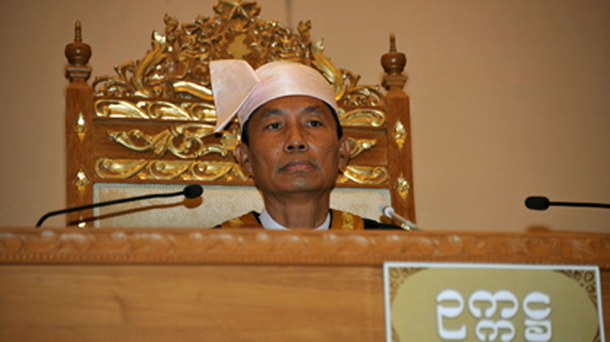The Burmese government has conceded that a federal union is the only way to guarantee peace and stability in the conflict-ridden nation, claim ethnic MPs.
Shwe Mann, the speaker of Burma’s Lower House of Parliament, reported told members on the sidelines of the legislature’s fourth session that a federal union was inevitable but would not arrive any time soon.
“[Shwe Mann] told me that his government agrees to set up federal union in order to have peace in the country,” said Nai Banyar Aung Moe, an MP for the All Mon Regions Democracy Party in the Lower House (Pyithu Hluttaw). “But the government will not agree to have eight federal states.”
Burma currently recognizes 135 distinct ethnic groups but for decades the military has vehemently objected to suggestions of a federal union for fear that different states would attempt to secede if granted regional autonomy.
Nai Banyar Aung Moe said that the federal issue will be raised in the future but it might take another five years to be implemented. He was part of a group of ethnic MPs that visited India earlier this month to study its federal system and how power is shared between state and union levels.
And ethnic MPs insist they will continue to bring up the issue of a federal Burma in Parliament even if the current military-dominated administration refuses to discuss it at the moment.
“We will do whatever we can in order to have a federal country even though we know we cannot manage this and have a real democracy with this Constitution,” said Ba Shein, an ethnic Arakanese lawyer and MP for the Rakhine Nationalities Development Party in the Lower House.
Representatives from all parties and ethnic groups must come together to fight for a federal union as it is simply a matter of convincing the top level of government to make the change, he said adding, “It is important to have a goal. One day we will reach our goal if we do not stop fighting.”
Burma has undergone a tentative process of democratic reform over the past year after more than half-a-century of military rule. The Parliament is now home to lively debates from a broad spectrum of society despite having 25 percent of seats reserved for armed forces personnel.
Democracy icon Aung San Suu Kyi joined the legislature along with 42 other members of her National League for Democracy party following a landslide win in the April 1 by-elections. Yet despite tentative democratic reforms, ethnic representatives are still effectively barred from top positions in regional assemblies due to the military’s dominance.
Burmese President Thein Sein met representatives from 10 minority political parties for the first time in Naypyidaw on Wednesday which observers say indicates that his government is keen to work on a more consensual basis in the future.
Zo Zam, chairmen of the Chin National Party, apparently proposed a federal union to Thein Sein at the meeting, although his suggestion was not reported in the state-run media.

















